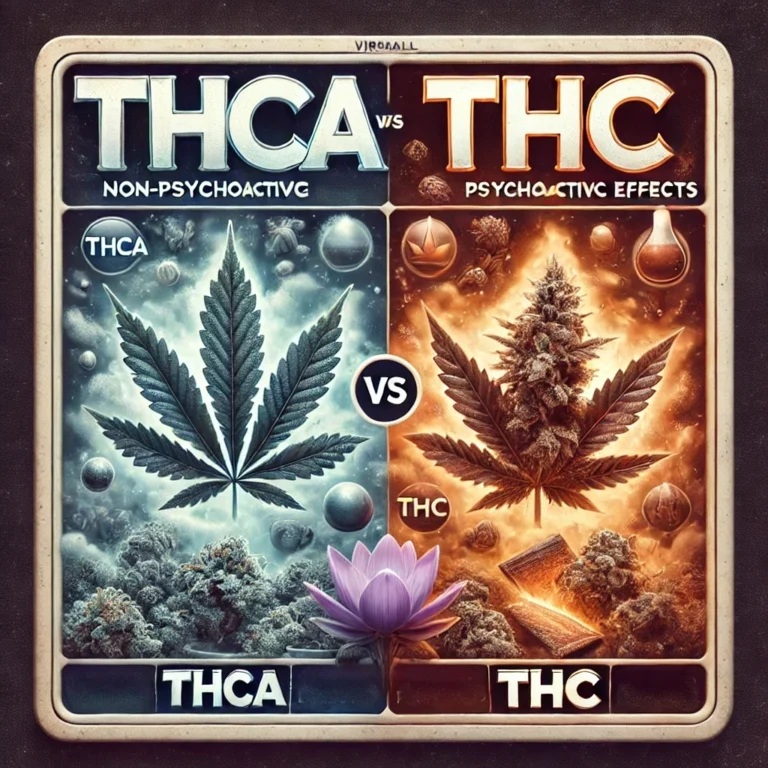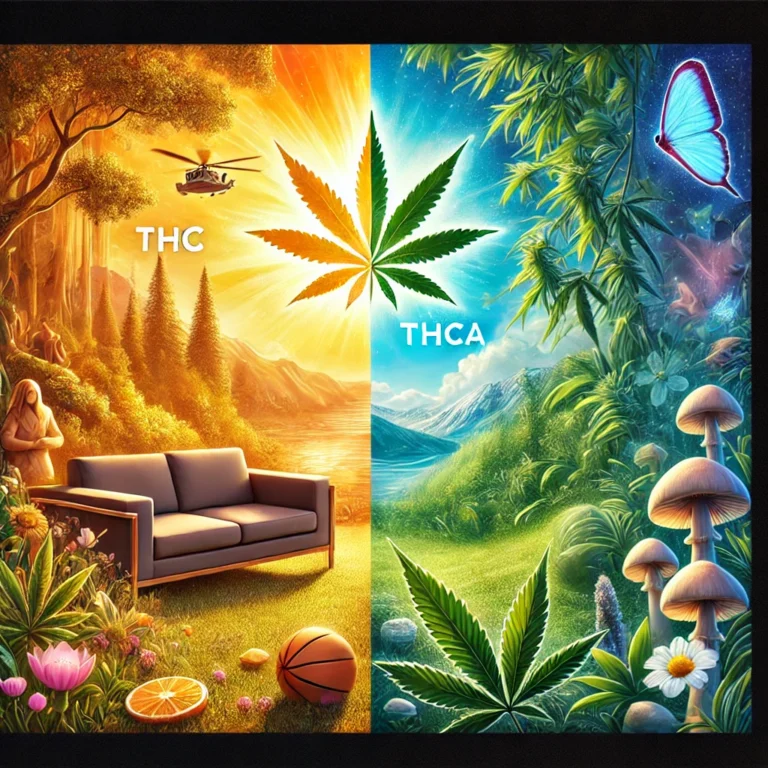When diving into the world of cannabis, understanding the difference between THCA and THC is essential. These compounds play a crucial role in how cannabis interacts with the body, and knowing their unique properties can help you make informed choices. In this blog post, we’ll break down the science, consumption methods, benefits, legality, and extraction processes of THCA and THC.

| Property | THCA (Tetrahydrocannabinolic Acid) | THC (Tetrahydrocannabinol) |
|---|---|---|
| Psychoactivity | Non-psychoactive | Psychoactive |
| Found In | Raw cannabis | Heated/processed cannabis |
| Primary Benefits | Anti-inflammatory, neuroprotective | Pain relief, euphoria, appetite stimulation |
| Conversion to THC | Through decarboxylation (heat) | N/A |
THCA, or tetrahydrocannabinolic acid, is a non-psychoactive compound found in raw cannabis. It’s the precursor to THC and is abundant in freshly harvested plants. THCA begins to convert into THC through a process called decarboxylation, which occurs when cannabis is heated or aged.
THC, or tetrahydrocannabinol, is the compound responsible for the psychoactive effects of cannabis. This cannabinoid interacts directly with the body’s endocannabinoid system, particularly CB1 receptors in the brain, leading to its well-known effects like euphoria and altered perception.
The way cannabis is consumed can significantly affect the presence and effects of THCA and THC. Here’s a breakdown:
| Consumption Method | Impact on THCA/THC | Effects |
| Raw Cannabis (Juicing) | High in THCA, no THC | Anti-inflammatory, no high |
| Smoking/Vaping | Converts THCA to THC (decarboxylation) | Psychoactive, pain relief |
| Edibles (Cooked) | Converts THCA to THC | Long-lasting psychoactive effects |
| Tinctures (Raw vs. Heated) | Retains THCA if raw; THC if heated | THCA: therapeutic; THC: psychoactive |

Raw Cannabis (Juicing): High in THCA, offering anti-inflammatory and neuroprotective benefits without psychoactive effects. Great for wellness-focused users.
Smoking/Vaping: Converts THCA to THC for fast-acting psychoactive effects, commonly used for pain relief and relaxation.
Edibles: Provide a potent, long-lasting experience, ideal for chronic pain management or insomnia.
Tinctures: Versatile and can be tailored to retain THCA or THC depending on processing.
The extraction method used to obtain THCA or THC can impact the quality, potency, and benefits of the final product.
| Extraction Method | Description | Impact on Effects |
| Natural (Solventless) | Uses heat, pressure, or water to extract compounds | Retains natural terpenes and cannabinoids for an “entourage effect“ |
| Solvent-Based (Natural) | Uses ethanol or CO2 to extract cannabinoids | Highly pure THC or THCA; may lose some terpenes |
| Synthetic | Lab-created THC or THCA | Precise dosing but lacks natural terpenes |

Natural Methods: Preserve terpenes and other cannabinoids, enhancing the entourage effect, where compounds work synergistically.
Synthetic Methods: Offer consistency and purity but may lack the nuanced effects provided by natural terpenes and minor cannabinoids.
The legal status of THCA and THC varies depending on location:
THCA: Legal in many regions as long as it is derived from hemp and contains less than 0.3% THC.
THC: Subject to stricter regulations. While legal in some states or countries for medical and recreational use, it remains federally illegal in many places.
THCA is ideal for users seeking therapeutic benefits without psychoactive effects. It’s found in raw cannabis and is non-intoxicating.
THC offers psychoactive effects and is effective for pain relief, appetite stimulation, and mood elevation.
The choice of consumption method and extraction process influences the effects and benefits of these cannabinoids.
Understanding the difference between THCA and THC allows for more tailored and effective cannabis use.
By understanding the difference between THCA and THC, consumers can make informed decisions based on their needs, preferences, and legal restrictions. Whether you’re interested in therapeutic benefits or psychoactive effects, knowing how to optimize consumption methods and extraction processes can enhance your cannabis experience.
Join our community of cannabis enthusiasts and terpene explorers! Get exclusive insights, in-depth guides, and the latest discoveries. No spam—just pure, aromatic knowledge delivered straight to your inbox.
Subscribe now and elevate your cannabis wisdom!